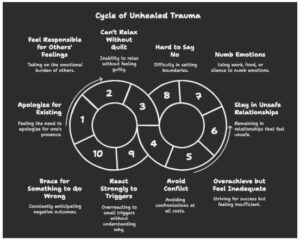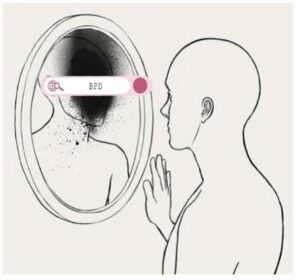Workplace trauma doesn’t simply end when you clock out. It lingers, impacting you well after the workday is over. Toxic work environments go beyond the typical “work stress” and can genuinely disrupt your nervous system, leaving you depleted before you even open your inbox.
When a Paycheck Costs Your Peace
Some jobs are physically demanding, but others take a toll on your mental and emotional health. The signs are rarely dramatic. Instead, it’s subtle, maybe it’s that knot in your stomach every time you get a message from your manager, the sense of unease that creeps in on Sunday evenings, or the tension in your shoulders during routine meetings. Your body is in fight-or-flight mode, even though you’re just sitting at your desk.
This isn’t just “part of the job.” It’s your nervous system responding to ongoing emotional stressors: unpredictable leaders, unclear expectations, impossible deadlines, and power dynamics that make you feel replaceable. It’s the kind of environment that prioritizes output over well-being.
There are plenty of examples of this. One employee described on Reddit how their boss would call after hours “just to check if they were really sick.” Someone else said they hadn’t taken a proper lunch break in three years out of fear they’d be seen as unproductive. These aren’t performance issues, they’re trauma responses, shaped by workplace cultures that devalue people in favor of numbers.
What’s deeply concerning is how normalized this has become. Many professionals are conditioned to accept it, telling themselves to push through, be grateful, or stay quiet.
Signs Your Job Might Be Traumatizing You
Workplace trauma rarely leaves physical evidence, but the symptoms are real and can be severe. Trauma shows up in your mind, your body, and your behavior.
You might notice:
- Consistent dread about work, even after time off
- Physical symptoms like headaches or nausea before work
- Sleep disruptions, either trouble falling asleep or waking up anxious
- Disengagement or irritability with friends and family
- Constant fear of reprimand or job loss
- Holding back opinions or emotions to avoid conflict
- Linking your self-worth to your productivity
- Heightened anxiety from a simple notification or meeting request
These aren’t just indicators of burnout. They point to a nervous system stuck in survival mode, constantly on alert for the next crisis.
The research supports this. A 2020 Journal of Occupational Health Psychology study found that toxic leadership styles significantly increase PTSD and depression symptoms among employees. Meanwhile, a 2022 study from IIM-Bangalore reported that a third of corporate employees felt emotionally unsafe at work, but only a small fraction sought support due to stigma.
In other words, if you’re experiencing these symptoms, it’s not your imagination. Your body is responding as it should in a difficult environment.
Busting the Myth: “It’s Just Work, Everyone Has to Suffer a Bit”
There’s a persistent belief in many industries that workplace hardship is a rite of passage. Phrases like “that’s just how this business works” or “you need to toughen up” are common. These messages are not truths; they’re coping mechanisms for dysfunctional systems and keep employees stuck in unhealthy roles.
On forums like r/antiwork, employees who raise concerns are often labeled “difficult” or “not team players.” One individual shared that after voicing concerns about unpaid overtime, they were ostracized by management and ultimately left the company due to stress-related health issues.
Your value is not determined by your ability to endure unhealthy conditions. Growth doesn’t require trauma, and setting boundaries is a sign of professionalism, not ingratitude.
The Inner Dialogues of Workplace Trauma
One of the most insidious effects of workplace trauma is how it changes your internal dialogue. The coping mechanisms you develop to survive a toxic environment can become deeply rooted beliefs:
“If I quit, I’ll look weak.”
“I shouldn’t complain, others have it worse.”
“Maybe I’m not cut out for this industry.”
“I have to say yes to everything, or I’ll be overlooked.”
“If I speak up, I could lose my job.”
These thoughts aren’t random, they’re developed in environments where raising concerns is risky and overwork is normalized.
One former employee of a multinational company shared on Reddit that they dismissed their own burnout symptoms, convinced they hadn’t “earned” a break because others appeared to be under more pressure. It wasn’t until a therapist identified their experience as trauma that they allowed themselves to process it.
If this resonates, know you’re not alone. Workplace trauma is real, and it deserves to be addressed, not minimized. Your health and well-being are as important as your performance, maybe more so.
What Healing from Workplace Trauma Might Look Like
Let’s dispel the myth right away: healing from workplace trauma isn’t always a dramatic exit or a headline-worthy resignation. Usually, it’s a far more understated process, one that starts internally, by tuning in to your own needs, and recognizing where your limits really are.
- Naming the Harm Without Justifying It
Here’s the truth: if a workplace experience caused you harm, that’s valid. There’s no need to justify it by comparing your experience to someone else’s, or by pointing to the salary or the perks. Acknowledging the impact, without rationalizing, minimizing, or excusing it, is a crucial first step.
Many professionals find it liberating to talk through these experiences in therapy, or even just to write them down. This isn’t about dwelling on the negative; it’s about reclaiming your narrative. As one professional put it, “I kept telling myself it wasn’t that bad, until my therapist simply asked: ‘Then why do you feel sick every morning before work?’ That was the wake-up call
- Rebuilding the Nervous System
Workplace trauma doesn’t just live in your memories, it settles in your body. You might notice you’re perpetually tense, waiting for the next crisis email, even on your off days.
The next phase of healing is nervous system regulation. Whether it’s through somatic therapy, breathwork, or simple grounding techniques, the goal is to restore your sense of physical safety. This isn’t just abstract advice; it’s a proven approach used by trauma-informed professionals worldwide. In India, for example, platforms like TheMindClan and Coach For Mind have made access to such care much easier.
- Redefining Work From the Inside Out
A key part of healing is asking yourself: what if “success” didn’t have to come at the expense of your well-being? What if boundaries weren’t seen as a weakness, but as a strategic asset?
Working with a therapist can help you reshape your relationship to work. You may find that you’re less reliant on external validation, more comfortable resting when needed, and more able to set priorities that align with your values. You might not quit your job right away, but your approach to your work will change.
Work doesn’t have to cost your identity.
A Mini Real-Life Example: Dev’s Story
Consider Dev, who spent seven years in advertising. On paper, he was the model employee, calm under pressure. In reality, he spent most days in a constant state of anxiety, dreading every new notification.
He told himself it was just the nature of the industry, until he found himself unable to hold it together during a lunch break. Through therapy, he realized what he’d labeled as “overreacting” was actually trauma.
Dev didn’t leave overnight. He made incremental changes: no work emails after 7 PM, no skipping meals, and learning to say “no” when necessary. A year later, he’s found a healthier work environment, and, more importantly, a healthier relationship with himself.
He put it simply: “I used to think I had to suffer to prove my value. Now I know I’m valuable, even when I rest.”
Why Therapy for Work Trauma Isn’t About Blame
Choosing to heal from workplace trauma isn’t about vilifying your employer or making a public spectacle. It’s about releasing the shame that never belonged to you in the first place.
It’s about grieving lost opportunities and health. It’s about recognizing how much of your self-worth was tied to performance metrics. It’s about understanding you were never “too much”, just in the wrong environment.
At Coach For Mind, our Indian trauma therapists focus on presence over productivity. Whether you remain in your current role or are ready to move on, we’re here to support your healing, not just for your career, but for your overall well-being.Visit www.coachformind.com to connect with a trauma therapist in India who understands.
FAQ: Workplace Trauma and Emotional Recovery
What is workplace trauma?
Workplace trauma isn’t just some abstract HR term, it’s the very real impact that occurs when your work environment chips away at your sense of safety, dignity, or control. And no, it doesn’t require dramatic outbursts or blatant harassment. More often, it shows up as relentless micromanagement, public criticism in meetings, constant work overload with zero support, or that feeling you could be replaced at any moment. Eventually, your body starts to treat your job as a threat, not just a set of tasks. This isn’t merely “not enjoying your work”, it’s your nervous system flagging real danger. The American Psychological Association recognizes that emotional abuse on the job can result in symptoms similar to PTSD, especially for employees with little power or support.
Can a job really cause trauma or PTSD symptoms?
Absolutely. It happens more often than people realize. While you may not always develop clinical PTSD from work, long-term exposure to a toxic environment can lead to complex trauma. That’s the kind that builds gradually, day by day. Research clearly indicates that ongoing emotional mistreatment, especially in workplaces where you can’t voice concerns or protect yourself, can trigger symptoms like hypervigilance, panic attacks, emotional detachment, or chronic fatigue. Employees aren’t exaggerating when they describe the experience as “walking on eggshells” or feeling “like a shell of themselves.” These are legitimate trauma responses resulting from a work environment that keeps the nervous system in a constant state of stress.
How do I know if I’m just sensitive or genuinely traumatized?
This is a common concern, especially for those accustomed to having their emotions dismissed. In reality, trauma is about safety, not sensitivity. If your body consistently reacts to your workplace with anxiety, dread, or exhaustion, that’s a valid response. It’s irrelevant if your role “looks fine” from the outside or if others insist they’ve experienced worse. What matters is your own internal experience. Research in trauma psychology shows that trauma isn’t just about what happens, it’s about whether you receive adequate support and recovery afterward. If your work leaves you emotionally bruised and constantly doubting yourself, that’s a sign your nervous system is under strain, not simply a matter of personality.
What are long-term effects of workplace trauma?
Over time, unresolved workplace trauma can severely impact both mental and physical health. It can erode self-confidence, create distrust among colleagues, and contribute to anxiety, depression, and, in extreme cases, thoughts of self-harm. Physically, it may lead to chronic exhaustion, headaches, digestive problems, and sleep disturbances. Even after leaving a problematic job, many professionals find themselves carrying residual anxiety into new roles, anticipating criticism, bracing for conflict, or questioning their own abilities. This “anticipatory stress,” as it’s called in trauma literature, often lingers until the underlying issues are addressed. Simply moving on to a new job doesn’t erase the impact; healing requires intentional effort.
Can therapy help even if I don’t want to leave my job?
Yes, and in fact, therapy can be especially valuable during ongoing employment in a challenging environment. It provides a safe space to process your experiences, regain your sense of agency, and learn practical skills for boundary-setting and emotional regulation. Therapists trained in trauma-informed care can help you accurately identify what’s happening, manage your stress response, and develop strategies to protect your well-being. While therapy may not immediately change your workplace, it can transform your internal experience, making it possible to cope effectively, advocate for yourself, or, if needed, prepare to transition out of your current role without unnecessary guilt.
How is workplace trauma different from burnout?
Let’s clear this up, these two get lumped together way too often, but they’re not the same thing. Burnout is what happens when you’re on the grind for too long, overloaded, drained, just running on empty. Sometimes, stepping away for a week (or even a long weekend) is enough to recharge. But trauma? That’s deeper. We’re talking about a sense of threat or feeling powerless, maybe even frozen, because of something that happened at work. It’s not just about being tired, it’s about feeling unsafe or disrespected. Even minor things, a short email, a meeting ping, can trigger panic or cause you to shut down. The critical point: trauma is a real, physiological response, not a performance issue. If you treat it like “just stress,” you risk missing the support people actually need.
What kind of therapy helps workplace trauma?
Not all therapy is created equal, especially when it comes to workplace trauma. Methods like Internal Family Systems (IFS), EMDR (Eye Movement Desensitization and Reprocessing), somatic therapy, and trauma-informed CBT are the gold standard here. They don’t just help you talk through what happened, they help your body process the stress that got stuck when you were in survival mode. Somatic therapy focuses on where trauma sits in the body, while IFS helps separate out the parts of you that feel stuck, overwhelmed, or checked out. The research is pretty clear: trauma-informed therapies are much more effective than standard counseling for real recovery.
How does Coach For Mind support people with workplace trauma?
At Coach For Mind, we recognize that trauma isn’t limited to your childhood or home life. It can come straight from your workplace, the place you spend most of your time. Our therapists have hands-on experience with both trauma recovery and the unique pressures of the professional world. We meet clients where they are, whether they’re planning to stay, looking to leave, or are simply unsure. Our goal isn’t to push people into decisions, but to provide a safe space to process what’s happening, restore a sense of agency, and rebuild confidence. You shouldn’t have to pretend everything’s fine just to keep your seat at the table. And you don’t have to manage this on your own.
Bottom line: Your job shouldn’t be the most stressful place in your life. Healing doesn’t hinge on quitting. It starts with acknowledging the impact, and recognizing that you deserve better.








